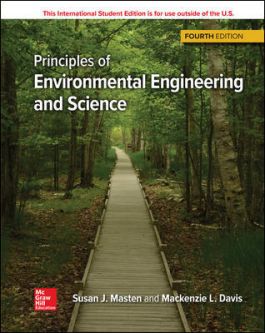Principles of Environmental Engineering and Science ISE
1260569551
·
9781260569551
Principles of Environmental Engineeringis intended for a course in introductory environmental engineering for sophomore- or junior-level students. This text provides a background in fundamental science and engineering principles of environmental engi…
Leer Más
Gracias este es un libro electrónico o EBOOK, para poder utilizarlo debes de crear una cuenta en VitalSource Bookshelf esta es una Aplicación Gratis. Una vez que has creado tu cuenta, dentro de la plataforma debes de redimir los distintos códigos que hayas adquirido para poder leer tus libros.
Para pagos en BBVA, transferencias interbancarias o tiendas de autoservicio, NO REDONDEAR el monto.
- Ingresa a tu libro desde cualquier lugar o dispositivo, con acceso a internet o sin acceso.
- Crear notas, y apuntes en tus lecturas.
- Puedes realizar búsquedas a los conceptos que necesites de manera rápida y fácil.
1 Introduction
2 Chemistry
3 Biology
4 Materials and Energy Balances
5 Ecosystems
6 Risk Perception, Assessment and Management
7 Hydrology
8 Sustainability
9 Water Quality Management
10 Water Treatment
11 Wastewater Treatment
12 Air Pollution
13 Solid Waste Engineering
14 Hazardous Waste Management
15 Noise Pollution
16 Ionizing Radiation
Appendix A: Properties of Air, Water, and Selected Chemicals
Appendix B: List of Elements with their Symbols and Atomic Masses
Appendix C: Periodic Table of Chemical Elements
Appendix D: Useful Unit Conversion and Prefixes
Appendix E: Greek Alphabet
Principles of Environmental Engineeringis intended for a course in introductory environmental engineering for sophomore- or junior-level students. This text provides a background in fundamental science and engineering principles of environmental engineering for students who may or may not become environmental engineers.
Principles places more emphasis on scientific principles, ethics, and safety, and focuses less on engineering design. The text exposes students to a broad range of environmental topics—including risk management, water quality and treatment, air pollution, hazardous waste, solid waste, and ionizing radiation as well as discussion of relevant regulations and practices.
The book also uses mass and energy balance as a tool for understanding environmental processes and solving environmental engineering problems.

